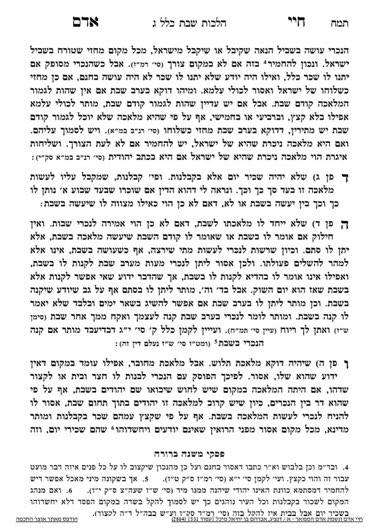We have finished siman 4, which discusses the criteria that the non-Jew be hired as a kablan. Yesterday, we learned four ways of understanding why Chazal were more lenient regarding a kablan over a sechir yom. The fourth explanation was that the primary element of the hiring of a sechir yom is time (because he is paid per day), as opposed to a kablan, who is only paid per job, and time is not a primary element.
We need to discuss how we consider a kablan who is paid by the hour. For example, if one hires a car mechanic to fix their engine, the mechanic does not get paid until he completes the job, but once he completes the job, he will bill based on an hourly basis. If the main element is the job, it is muttar. We could argue this angle based on the fact that the mechanic does not get paid until he finishes the job. If the main element is the time, we would have a problem. We could argue this angle based on the fact that he is still being paid per hour of work.
The poskim assume that such an arrangement would be muttar. They explain that in this case, the hours are a way to measure the value of the labor put into the job. They do not detract from the fact that the kablan was hired for the job and not to work per hour. For example, in many situations, the mechanic has a set price for his work, in which he assumes a standard amount of hours a repair will take, even if it ends up taking more or less time. For example, he may assume it takes seven hours to replace an engine block, and will set that as his standard, regardless of whether a specific engine takes a little longer or shorter. If so, the time element is not a defining element of the work, so it is muttar.
This argument leads us to the Chayei Adam’s next question. If a person is hired to work for a year, do we say that the fact he is given a large amount of time to work makes it different than a sechir yom, who is hired for a specific day (or days), or do we say that the primary aspect of a kablan is that he is hired for a specific job, and not for a period of time. The Chayei Adam holds such a person is considered a kablan, so such an arrangement is muttar over Shabbos.
The Chayei Adam explains that when a person is hired for a larger period of time (even for just a week), as long as the non-Jew retains the freedom to choose when he wants to complete the work, he is considered a kablan. This explanation fits well with the second explanation we learned yesterday, that the defining difference between a kablan and sechir yom is whether they are bound to a specific time in which they must perform the work.
This psak of the Chayei Adam is a chiddush; we will clarify the machlokes about it tomorrow, be’ezras Hashem.
Summary
- A kablan who is paid by the hour is considered a kablan, as long as the primary element of the arrangement is the completion of the job, not the time it takes.
- A kablan who is hired for a large amount of time is considered a kablan, as long as the non-Jew retains the freedom to decide when they would like perform the work.



